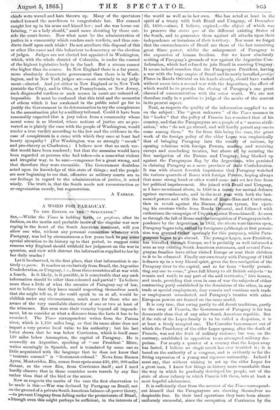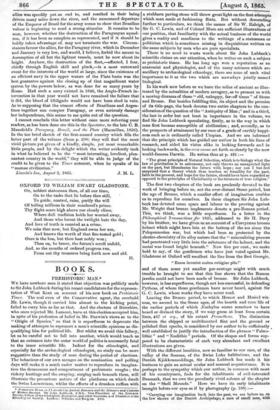A WORD FO4 PAR A.GUAY.
To THE EDITOR OF THE " SPECTATOR."
SIR,—Whilst the Times is holding forth, ex profess°, after its fashion, on the merits and probable issues of the singular war now raging in the heart of the South American continent, will you allow one who, without any personal connection whatever with Paraguay, was led by circumstances a few years back to pay some special attention to its history up to that period, to suggest some reasons why England should withhold her judgment on the war in question, and viefr with distrust the information supplied to her by her daily oracles ?
Let it be observed, in the first place, that that information is en- tirely ex parte. It reaches us exclusively from Brazil, the Argentine Confederation, or Uruguay, i. e., from three countries all at war with a fourth. Is it likely, is it possible, is it conceivable that any such information should be other than coloured and partial? To believe more than a little of what. the enemies of Paraguay say of her, not to believe that they leave unpaid respecting themselves much that she might tell us, if she could speak to us at all, would be childish under any circumstances, much more for those who are aware of the very unreliable character of one or two at least of the witnesses. But even were their veracity beyond all impeach- ment, let us consider at what a distance from the facts it has to be exercised. The Times correspondent writes from the Parana river, which is 1,450 miles long, so that its name alone does not impart a very precise local value to his authority ; but his last letter shows that he was below Corrientes, which is itself some 130 miles below Assumption, the capital of Paraguay. He is avowedly an Argentine, speaking of " our President " Mitre, writes seemingly in Spanish, and is translated by some one so little acquainted with the language that he does not know that " teniente coronel " is " lieutenant-colonel." News from Buenos Ayres, Montevideo, Rio, comes from spots some 430, 480, 900 miles distant, as the crow flies, from Corrientes itself ; and I need hardly observe that in those countries news travels by any line rather than that of the bird or the arrow.
Now as respects the merits of the case the first observation to be made is this :—War was declared by Paraguay on Brazil, not on the ground of a private South American balance-of-power theory, —to prevent Uruguay from falling under the protectorate of Brazil, although even this might perhaps be sufficient, in the interests of the world as well as in her own. She has acted at least in time spirit of a treaty with both Brazil and Uruguay, of December 25, 1850,—since, I believe, expired,—the object of which was to preserve the status quo of the different existing States of the South, and to guarantee them against all attacks upon their independence or invasions of their territory. Nor must we forget that the encroachments of Brazil are those of the last remaining great Slave power, whilst the enlargement of Paraguay is the expansion of human freedom. But we know absolutely nothing of Paraguay's grounds of war against the Argentine Con- federation, which had refused to join Brazil in coercing Uruguay. It seems indeed senseless that the Paraguayan President, having a war with the huge empire of Brazil and its newly installed protegd Flores in Banda Oriental on his hands already, should have rushed without cause into a second war with the Argentines, the effect of which would be to provoke the closing of Paraguay's one great channel of communication with the outer world. We are not therefore really in a position to judge of the merits of the contest in its present aspect.
Next, as respects the quality of the information supplied to us on the subject : The "great unknown" of the Times assumes in his " leader" that the policy of Fraucia has remained that of his country, and that the Paraguayans are a people of a " morose civili- zation," who " do not go abroad, and will hardly permit any one to come among them." So far from this being the case, the great work of the foreign policy of the elder Lopez was emphatically that of briuging Paraguay into the con* of nations, by opening relations with foreign Powers, sending and receiving envoys and concluding treaties, but above all by securing the free navigation of the Parana and Uruguay, long blocked up against the Paraguayan flag by the Argentines, who persisted in claiming Paraguay as a mere province of their Confederation. It was with almost feverish impatience that Paraguay watched the various quarrels of Roses with foreign POlvers, hoping always that some strong hand or other would come imid set her free from her political imprisonment. She joined with 'razil and Uruguay, as I have mentioned above, in 1850 in a triaty for mutual defence against encroachments, and in the next with both the last- named powers and with the States of e-Rios and Corrientes, then in revolt against the Buenos can tyrant, for eject- ing his creature Oribe from Banda ental, and followed with enthusiasm the campaign of Urqaiza against Roses himself. As soon as through the fall of Roses and-the recognition of Paraguayan inde- pendence by the Argentinas, *1852, the rivers were thrown open, Paraguay began tobe.varted by foreigners (although at first permis- sion was grautediatlor sparingly for this purpose), whilst Para- guayans began to go abroad. The younger Lopez, now President, has travelled through Europe, and is probably as well informed a man as any existing South American statesman, and several Para- guayan families have either visited Europe or sent their children to it to be educated: Finally our own treaty with Paraguay of 1853 is drawn up in a very liberal spirit, gives the free navigation of the Paraguay river to the capital, and so far from " hardly permit- ting any one to come," gives full liberty to all British subjects "to remain and reside in any part of the said territories," hire houses, and trade, providing that even in case of war the subjects of either contracting party established in the dominions of the other, in any trade or special employment, may remain and continue such trade or employment unmolested, and Paraguay's treaties with other European powers are framed on the same model.
It is very true, that owing partly to old Jesuit traditions, partly to the sway of Francia, the Government of Paraguay is far leas democratic than that of any other South American republic. But if the rule of the Lopez family is to be called a despotism, it is at least a freely accepted one. The Consular Government out of which the Presidency of the elder Lopez sprang, after the death of Francis, was not the fruit of military violence, but was, on the contrary, established in opposition to an attempted military des- potism. For nearly a quarter of a century that the Lopez sway has lasted, I believe no single revolt has ever troubled it ; it is based on the authority of a congress, and is evidently so far the fitting expression of a young and vigorous nationality. Indeed I must say, that without wishing to set up the elder Lopez for a great man, I know few things in history more remarkable than the way in which he gradually developed his people, out of the state of sheer infancy in which Francia left them, into at least a most hopeful adolescence.
It is sufficiently clear from the account of the Times correspond- ent himself that the Paraguayans are showing themselves no despicable foes. In their land operations they have been almost uniformly successful, since the occupation of Corrientes by the
allies was speedily put an end to, and resulted in their being driven many miles down the river, and the announced departure of the Emperor of Brazil for the army seems to show that Brazilian valour is beginning to need a strong stimulus. It remains to be seen, however, whether the destruction of the Paraguayan squad- ron, if it has been as complete as represented, and if it should be boldly taken advantage of, may not terminate the war. Circum- stances favour the allies, for the Paraguay river, which in December and January is very low, and would, I believe, forbid the ascent to Assumption of all but the lightest vessels, must be now about its height. Anyhow, the destruction of the fleet,—effected, I fear, chiefly through English skill and pluck,—is a most untoward event for the interests of the world at large, since the existence of an efficient navy in the upper waters of the Plate basin was the best guarantee against the closing up of that magnificent water system by the powers below, as was done for so many years by Roses. Had such a navy existed in 1846, the Anglo-French in- tervention in that year would not have remained the failure that it did, the blood of Obliged° would not have been shed in vain. As to supposing that the utmost efforts of Brazilians and Argen- tines together can conquer Paraguay, or even seriously damage her independence, this seems to me quite out of the question.
I cannot conclude this letter without once more referring your readers, as has been done ere this in the Spectator, to the late C. B. Mansfield's Paraguay, Brazil, and the Plate (Macmillan, 1856). In the too brief sketch of the first-named country which fills the latter part of the volume (from p. 298) they will find the most vivid picture yet given of a kindly, simple, yet most remarkable little people, and by the delight which the writer evidently took in what he believed to be the " most interesting, loveliest, plea- santest country in the world," they will be able to judge of the credit to be given to the Times autocrat, when he speaks of its "morose civilization."































 Previous page
Previous page